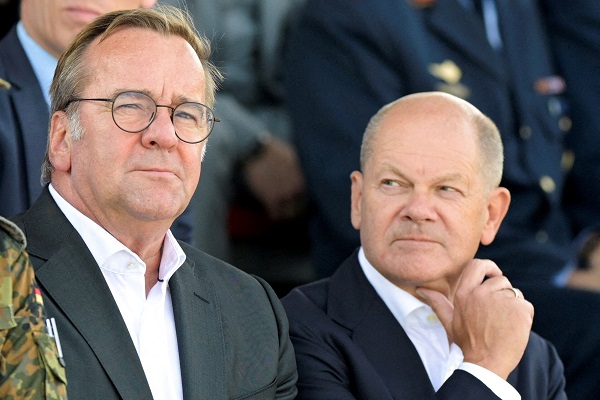 German Chancellor Olaf Scholz and Defence Minister Boris Pistorius take part in the commissioning of the IRIS-T SLM air defence system at the German army Bundeswehr barracks Todendorf in Panker, Germany, 4 September 2024;
Credit: Reuters/Fabian Bimmer/File Photo
German Chancellor Olaf Scholz and Defence Minister Boris Pistorius take part in the commissioning of the IRIS-T SLM air defence system at the German army Bundeswehr barracks Todendorf in Panker, Germany, 4 September 2024;
Credit: Reuters/Fabian Bimmer/File Photo
BERLIN (Reuters) - German Chancellor Olaf Scholz was set to run for a second term in upcoming snap elections after his popular Defence Minister Boris Pistorius - a possible replacement - ruled himself out of the running on Thursday 21 November 2024.
The news gave some relief after weeks of uncertainty over whether Pistorius would step into the frame with the elections just months away on 23 February 2025.
But it leaves the ruling Social Democrats (SPD) with Germany's most unpopular chancellor on record as their candidate at a time when the party is already trailing in third place behind the opposition conservatives and the far-right.
"I have just informed our party and parliamentary group leaders that I will not be standing as a candidate for the office of federal chancellor," Pistorius said in a video posted to SPD social media channels on Thursday evening. "This is my sovereign, personal and entirely personal decision."
Traditionally, the incumbent chancellor would always be in pole position to lead his or her party into the next election - former Chancellor Angela Merkel won four consecutive terms for the conservatives.
But the stark difference in popularity between the diffident Scholz and Pistorius, Germany's most popular politician since he stepped on to the national stage as defence minister two years ago, had raised doubts about whether this was the best course of action.
Even within the SPD, a majority favored Pistorius running for chancellor over Scholz, who earlier this month oversaw the collapse of his fractious three-way coalition over differences about how to revive the ailing economy.
SPD languishing
Pistorius fully threw his backing behind Scholz for the first time on Thursday evening.
"In Olaf Scholz, we have an outstanding federal chancellor," he said. "He has led a coalition of three parties through perhaps the biggest crisis in recent decades."
On Monday 25 November 2024, the SPD leadership will seek the official nomination of Scholz as the party's chancellor candidate, a party source told Reuters.
Still, the lack of confidence shown in Scholz in recent days, even within his own party, will put him at a further disadvantage compared with his main rival, the conservatives' chancellor candidate Friedrich Merz, political analysts say.
Leading SPD politicians had come out calling for Scholz to step aside in favour of Pistorius.
Scholz's SPD are polling around 15% in national surveys, down more than 10 points from their score in the 2021 elections and less than half the conservatives' 33%. The far-right AfD meanwhile is in second place at around 18%.
Scholz's entourage remains confident that the chancellor may yet prevail given his standing as a steady hand in difficult times - whereas Merz has no previous government experience and is known for gaffes and angry outbursts.
The Greens, trailing in fourth place at around 11%, have also nominated a chancellor candidate, Robert Habeck - currently Scholz's vice chancellor and economy minister.








